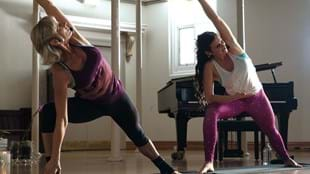As you can imagine, there have been plenty of studies performed over the years examining the effects of yoga, and some more specifically looking at BODYBALANCE™. These studies have found that doing these types of workouts regularly produces significant effects on psychological well-being, a number of health factors and are therefore a great complement to any training program.
So what do we specifically know about BODYBALANCE™/BODYFLOW™? Does it deliver some of the same benefits as yoga? The answer is yes!
BODYBALANCE™ / BODYFLOW™
- A study in 2008 (Khan 2008) measured the effects of doing BODYBALANCE™ three times per week for 12 weeks. Alongside all the expected effects, participants also saw reductions in anxiety, as well as significant increases in core strength and hip mobility.
As for yoga in general, here's what we know:
Psychological Health
- The effects of yoga were comparable to that of pharmacological treatment, group therapy, social support groups, and massage. (Cramer, et al, 2013)
- Due to its good compliance and lack of drug interactions, yoga appears to be safe and could be encouraged to improve quality of life and, perhaps, the symptoms of stress and anxiety. (Li & Goldsmith, 2012)
- Yoga is beneficial at reducing stress. It is effective in treating emotional-stress related conditions when compared with mindful exercises such as qigong and tai chi. (Chong, 2011)
Physiological Heath
- Small beneficial effects were seen in triglycerides, high-density lipoprotein (HDL) cholesterol and diastolic blood pressure. Given the limited evidence to date, we are unable to determine the effects of yoga in the primary prevention of cardiovascular disease. (Hartley et al, 2014)
- Yoga has moderate effects on physical fitness (strength, cardiorespiratory function) and function (balance, walking speed) in older adults. (Roland et al, 2011)
- The studies comparing the effects of yoga and exercise indicate that, in both healthy and diseased populations, yoga may be effective at improving a variety of health outcomes including blood glucose (helping to avoid diabetes), blood lipids and stress indicators. (Ross and Thomas, 2010).
Body Composition
- Yoga appears to be an appropriate and potentially successful intervention for weight maintenance, prevention of obesity, and risk reduction for diseases in which obesity plays a significant causal role. (Rioux & Ritenbaugh, 2013). Gradual, moderate reductions in weight and Body Mass Index were seen across the majority of interventions when practiced for 60 minutes, three times per week for three months or more.
- Yoga practice is an effective method to reduce body weight in overweight adults. (Yang, 2007)
Other Benefits
- There is strong evidence for short-term and moderate evidence for long-term reduction of low back pain and back-specific disability after yoga interventions. (Cramer et al, 2013)
- Hatha and Restorative yoga have the highest correlation with positive outcomes for managing pain. (McCall et al, 2013)
- The findings indicate small effects of yoga interventions on fatigue, particularly in patients with cancer. (Boehm et al, 2012)
- In both healthy and diseased populations, yoga appears to improve subjective measures of fatigue,pain, and sleep. (Ross and Thomas, 2010)
Pregnant Women
- A prenatal yoga program results in benefits during pregnancy as well as throughout labor and birth. Improvements were observed on psychological factors during pregnancy and labor, on physical and pain measures during labor and on birth weight and number of preterm births. (Curtis et al, 2012) To find out more about the benefits of exercising during pregnancy click here.
If you want more health and fitness inspiration simply sign up to Fit Planet and get the freshest insights and advice straight to your inbox.
REFERENCES
Boehm K, Ostermann T, Milazzo S, Bussing A. Effects of Yoga Interventions on Fatigue: A Meta-Analysis. Evidence-Based Complementary and Alternative Medicine; 1-9, 2012
Bussing, A, Michalsen A, Khalsa SBS, Telles S, Sherman KJ. Effects of Yoga on Mental and Physical Health: A Short Summary of Reviews. Evidence-Based Complementary and Alternative Medicine; 1-7, 2012
Chong, CSM, Tsunaka M, Tsang HWH, Chan EP, Cheung W. Effects of Yoga on Stress Management in Healthy Adults: A Systematic Review. Alternative Therapies in Health and Medicine; 17, 1, 2011.
Cramer H, Lauche R, Haller H, Dobos G. A Systematic Review and Meta-analysis of Yoga for Low Back Pain. Clinical Journal of Pain, 29:450-460, 2013.
Cramer H, Lauche R, Langhorst J, Dobos G. Yoga for depression: a systematic review and meta-analysis depression and anxiety. Depression and Anxiety; 30:1068–1083, 2013.
Curtis K, Weinrib A, Katz J. Systematic Review of Yoga for Pregnant Women: Current Status and Future Directions Evidence-Based Complementary and Alternative Medicine; 1-13, 2012.
Hartley L, Dyakova M, Holmes J, Clarke A, Lee MS, Ernst E, Rees K. Yoga for the primary prevention of cardiovascular disease. The Cochrane Library; 5, 2014.
Li AW & Goldsmith CAW. The Effects of Yoga on Anxiety and Stress Alternative Medicine Review: 17:21-35, 2012.
Khan, Physiological and psychological responses to a 12-week BodyBalance training programme Journal of Science and Medicine in Sport (2008]
McCall MC, Ward A, Roberts NW, Heneghan C. Overview of Systematic Reviews: Yoga as a Therapeutic Intervention for Adults with Acute and Chronic Health Conditions. Evidence-Based Complementary and Alternative Medicine, 1-18, 2013.
Rioux, J, and Ritenbaugh C. Narrative Review of Yoga Intervention Clinical Trials Including Weight-related Outcomes. Alternative Therapies in Health and Medicine; 19, 3, 2013.
Roland KP, Jakobi JM, Jones GR. Does Yoga Engender Fitness in Older Adults? A Critical Review. Journal of Aging and Physical Activity; 19:62-79, 2011.
Ross A & Thomas S. The Health Benefits of Yoga and Exercise: A Review of Comparison Studies. The Journal Of Alternative And Complementary Medicine; 16:3-12, 2010.
Yang K. A Review of Yoga Programs for Four Leading Risk Factors of Chronic Diseases. Advance Access Publication; 4:487-491, 2007.








